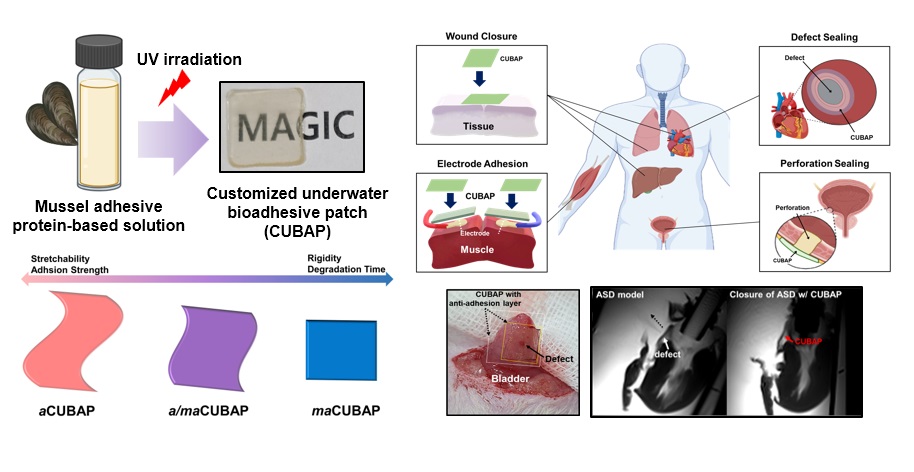
연구
Research Outcome
미래를 창조하는 포스텍 화학공학과
A Customizable Proteinic Bioadhesive Patch with Water-Switchable Underwater Adhesiveness, Adjustable Biodegradability, and Modifiable Stretchability for Healing Diverse Internal Wounds
- Title of paper
- A Customizable Proteinic Bioadhesive Patch with Water-Switchable Underwater Adhesiveness, Adjustable Biodegradability, and Modifiable Stretchability for Healing Diverse Internal Wounds
- Author
- [차형준교수 연구실] 장기결손치료 및 생체이식용 생분해성과 유연성이 조절 가능한 단백질소재 기반 장기 맞춤형 수중생체접착패치 개발
- Publication in journal
- Advanced Materials
- Publication date
- 20231226

[Abstract]
Customizable bioadhesives for individual organ requirements, including tissue type and motion, are essential, especially given the rise in implantable medical device applications demanding adequate underwater adhesion. While synthetic bioadhesives are widely used, their toxicity upon degradation shifts focus to biocompatible natural biomaterials. However, enhancing the adhesive strengths of these biomaterials presents ongoing challenges while accommodating the unique properties of specific organs. To address these issues, three types of customized underwater bioadhesive patches (CUBAPs) with strong, water-responsive adhesion and controllable biodegradability and stretchability based on bioengineered mussel adhesive proteins conjugated with acrylic acid and/or methacrylic acid are proposed. The CUBAP system, although initially nonadhesive, shows strong underwater adhesion upon hydration, adjustable biodegradation, and adequate physical properties by adjusting the ratio of poly(acrylic acid) and poly(methacrylic acid). Through ex vivo and in vivo evaluations using defective organs and the implantation of electronic devices, the suitability of using CUBAPs for effective wound healing in diverse internal organs is demonstrated. Thus, this innovative CUBAP system offers strong underwater adhesiveness with tailored biodegradation timing and physical properties, giving it great potential in various biomedical applications.
DOI: https://doi.org/10.1002/adma.202310338
LINK: https://onlinelibrary.wiley.com/doi/10.1002/adma.202310338



